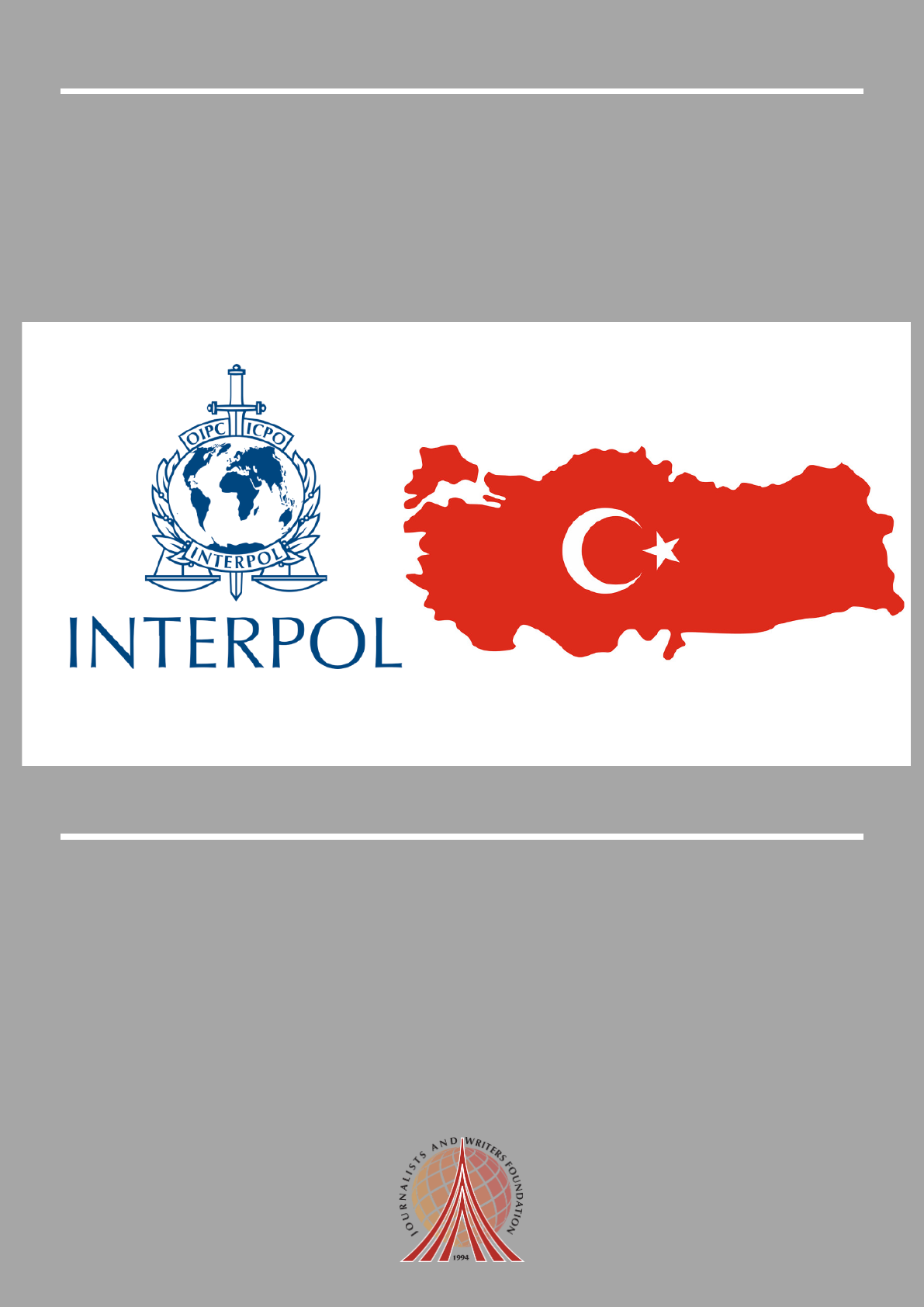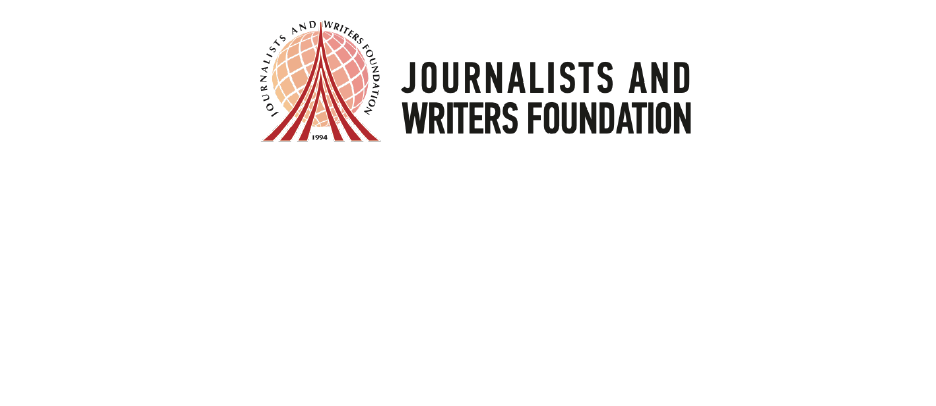
ABUSE OF INTERPOL’S
NOTICE SYSTEM BY TURKEY
NOVEMBER 22, 2021
Case of Selahaddin Gülen in Kenya
Case of Muaz Türkyılmaz in Panama
SPECIAL REPORT

The Journalists and Writers Foundation (JWF) is an international civil society organization
dedicated to the culture of peace, human rights, and sustainable development. The JWF promotes
diversity and inclusion by creating forums for intellectual and social engagement; generates and
shares knowledge with stakeholders, builds partnerships worldwide and develops policy
recommendations for positive social change.
* The JWF is a 501(c)3 not-for-profit organization incorporated in New York, USA.
* The JWF is accredited by the United Nations Department of Global Communications.
CONTACT
Address: 56 W45 Street 4th Floor New York, NY 10036
Phone : +1 (646) 838-4882
E-mail : [email protected]
Website: www.jwf.org
Copyright © 2021 Journalists and Writers Foundation
All rights reserved.
Published in November 2021
Designed in the United States of America
COPYRIGHT & DISTRIBUTION
Material from this report may be reproduced for noncommercial purposes only if the Journalists
and Writers Foundation (JWF) is fully acknowledged. The report may also be distributed and
linked to it from your website if the JWF is credited as the source. No part of this report may be
reproduced or distributed for any commercial purposes without the prior permission of the
copyright holder.
DISCLAIMER
The JWF has made every effort to ensure the accuracy and reliability of the information in this
report; however, the JWF does not guarantee or accept any legal liability whatsoever arising from
any mistakes based on the information acquired from public sources, organizations, media outlets,
and individuals. We welcome recommendations for corrections with reliable and acceptable
sources.

[JWF] Abuse of Interpol’s Notice System by Turkey
2
Table of Contents
I. Introduction ................................................................................................................. 3
II. Interpol’s notices system ............................................................................................. 4
III. Abuse of the Interpol system ....................................................................................... 5
IV. Case of Selahaddin Gülen in Kenya ............................................................................ 7
V. Case of Muaz Türkyılmaz in Panama ......................................................................... 11
V. Observations and Conclusions .................................................................................. 11
VI. Recommendations to Interpol and the Member States .............................................. 12

[JWF] Abuse of Interpol’s Notice System by Turkey
3
ABUSE OF INTERPOL’S NOTICE SYSTEM BY TURKEY
I. Introduction
1. On July 15, 2016
1
, a small faction of the Turkish Armed Forces (TSK) that called themselves
the “Peace at Home Council” attempted to overthrow the Government of Turkey by seizing
control of several key places in Ankara, Istanbul, and other locations. Forces loyal to the
government were able to defeat the coup plotters and the attempted coup was thwarted within
approximately 12 hours. According to official sources at least 246 people were killed and
more than 2,000 were injured during the attempt.
2
As the attempted coup was still ongoing,
the government accused the Hizmet/Gülen Movement (hereafter: “Hizmet Movement”) of
orchestrating it and its real or perceived members or sympathizers for membership of a
terrorist organization attempting to overthrow the government. The Hizmet Movement has
denied any involvement in the attempted coup, reiterating its long-standing position against
use of any kind of violence.
2. An unprecedented crackdown on human rights and fundamental freedoms targeting citizens
from all walks of life, in particular the education, media, military, and justice sectors is still
ongoing, with measures introduced under the umbrella of the state of emergency and post-
state of emergency severely limiting individual rights and liberties.
3. According to the Turkish authorities, by the end of February 2021, 622,646 individuals were
investigated for ties to the Hizmet Movement; 301,932 were detained (‘gözaltı’ in Turkish)
by the police and 96,782 conditionally released under judicial control.
3
From July 2016 to
December 2017 only, the Turkish authorities also revoked 234,419 passports,
4
with the
overall number of cancelled passports by October 2021 estimated to be over 650,000.
5
4. Almost immediately following the attempted coup of July 2016, the Government of Turkey
also began a global purge that mirrors its domestic crackdown, increasingly reaching beyond
Turkey’s borders to intimidate or silence all those perceived as members of the Hizmet
Movement. In its global transnational repression efforts since 2014, Turkey has now become
the number one country carrying out renditions from other states, with the Turkish
1
The events related to the attempted coup began at 7:29 p.m. in the evening of July 15, 2016
2
Committee against Torture, Concluding observations on the fourth periodic report of Turkey, Addendum Information
received from Turkey on follow-up to the concluding observations (CAT/C/TUR/CO/4/Add.1), Nov 8, 2016, para 61.
3
See for more: https://www.aa.com.tr/tr/turkiye/icisleri-bakani-soylu-garaya-giden-hdpli-vekili-acikladi/2151784.
4
According to official data (Turkish Interior Ministry): 55,665 were jailed, 234,419 passports revoked since coup
attempt, available at: https://turkeypurge.com/turkish-interior-minister-55665-jailed-234419-passports-revoked-
since-coup-attempt.
5
For the emergency legislations on the passport revocations, see: Yildiz, Ali: Turkey’s Disregard for the Freedom of
Movement, VerfBlog, 2019/12/11, https://verfassungsblog.de/turkeys-disregard-for-the-freedom-of-movement/

[JWF] Abuse of Interpol’s Notice System by Turkey
4
government confirming that it has been able to abduct and illegally transfer to Turkey 139
victims from 33 countries.
6
5. The UN Working Group on Arbitrary Detention has consistently expressed concern over the
pattern that all these cases follow, recalling that under certain circumstances, widespread or
systematic imprisonment or other severe deprivation of liberty in violation of the rules of
international law may constitute crimes against humanity.
7
In addition, The 1992
Declaration for the Protection of All Persons from Enforced Disappearances is very clear
about the connection between the systematic nature of enforced disappearances perpetrated
by the Government of Turkey since July 2016 and crimes against humanity. The “systematic
practice of enforced disappearances is by its very nature a crime against humanity”.
8
II. Interpol’s Notices System
9
6. The International Criminal Police Organization (INTERPOL) is an inter-governmental
organization enabling police in its 194 member countries to work together in order to
prevent and fight international crime. In achieving its objectives, Interpol enables member
countries to share and access data on crimes and criminals, offering a range of technical and
operational support.
7. One of Interpol’s most important functions is to help police in its member countries share
critical crime-related information using the organization’s system of international notices.
Police can use Interpol notices to alert law enforcement in other countries of potential threats,
or to ask for assistance in solving crimes. Notices can also be used by the United Nations
Security Council, the International Criminal Court, and international criminal tribunals to
warn that certain individuals and entities face UN sanctions.
8. The most common notice is the Red Notice, which purpose is to seek the location and arrest
of a person wanted by a legal jurisdiction or an international tribunal with a view to his/her
extradition. The legal basis for a Red Notice is an arrest warrant or court order issued by
judicial authorities in a country. Many of Interpol’s member countries consider a Red Notice
to be a valid request for provisional arrest. Furthermore, Interpol is an official channel for
transmitting requests for provisional arrest in several bilateral and multilateral extradition
treaties, including the European Convention on Extradition, the Economic Community of
6
See for more: https://www.aa.com.tr/tr/turkiye/icisleri-bakani-soylu-garaya-giden-hdpli-vekili-acikladi/2151784.
7
See for example
https://www.ohchr.org/Documents/Issues/Detention/Opinions/Session89/A_HRC_WGAD_2020_84.pdf
8
Considering that enforced disappearance undermines the deepest values of any society committed to respect for the
rule of law, human rights and fundamental freedoms, and that the systematic practice of such acts is of the nature of
a crime against humanity.
9
Interpol Fact Sheet (COM/FS/2020-03/GI-02), https://www.interpol.int/en/Resources/Documents#Fact-Sheets

[JWF] Abuse of Interpol’s Notice System by Turkey
5
West African States (ECOWAS) Convention on Extradition, and the United Nations Model
Treaty on Extradition.
9. In addition to red notices, Interpol issues Blue, Green, Yellow, Black, Purple, as well as UN
Security Council Special Notices, the latter to inform Interpol’s members that an individual
or an entity is subject to UN sanctions. Similar to the notice, a Diffusion is issued for the
same purposes as notices but sent directly by a member country or an international entity to
the countries of their choice. Diffusions are also recorded in the Organization’s police
databases.
10. Notices and diffusions contain two main types of information: (i) identity details (physical
description, photograph, fingerprints, identity document numbers, etc.) and (ii) judicial
information (offence with which the person is charged; references to the laws under which
the charge is made or conviction was obtained; references to the arrest warrant or court
sentence, etc.).
III. Abuse of the Interpol System
11. Article 2(1) of Interpol’s Constitution stipulates that the Organization should “ensure and
promote the widest possible mutual assistance between all criminal police authorities within
the limits of the laws existing in the different countries and in the spirit of the Universal
Declaration of Human Rights.”
12. International police cooperation therefore should be conducted in the spirit of the Universal
Declaration of Human Rights, a set of principles protecting human rights that all UN
Member States are expected to uphold. In particular, “red notices” will not be published if
they violate the Interpol Constitution, which forbids the organization from “undertaking any
intervention or activities of a political, military, religious, or racial character.” In 2015,
Interpol also adopted a new policy to remove a “red notice” if it can be verified that the
person has been recognized as refugee under the 1951 Refugee Convention.
13. Article 34 of Interpol’s Rules on the Processing of Data (RPD) further states that: (i) 34(2):
“(…) prior to any recording of data in a police database, the National Central Bureau,
national entity or international entity shall ensure that the data are in compliance with
Article 3 of the Organization’s Constitution”; (ii) 34(3): “To determine whether data comply
with Article 3 of the Constitution, all relevant elements shall be examined, such as: (a) nature
of the offence, namely the charges and underlying facts; (b) status of the persons concerned;
(c) identity of the source of the data; (d) the position expressed by another National Central
Bureau or another international entity; (e) obligations under international law; (f)
implications for the neutrality of the Organization; (g) the general context of the case.“

[JWF] Abuse of Interpol’s Notice System by Turkey
6
14. Resolution ref. AGN/20/RES/11 (1951) requires applying the predominance test (even if
in the requesting country the facts amount to an offence against the ordinary law). It states
that “(…) no request for information, notice of persons wanted and, above all, no request
for provisional arrest for offences of a predominantly political, military, religious or racial
character is ever sent to the International Bureau or the NCBs, even if - in the requesting
country - the facts amount to an offence against the ordinary law.”
15. From Member State’s perspective, Article 34(1) of the Rules on the Processing of Data
(RPD) stipulates that, “the National Central Bureau, national entity or international entity
shall ensure that the data are in compliance with Article 2 of the Organization’s
Constitution.” Pursuant to Article 84 (b) of the RPD, the requesting National Country Bureau
who has asked for the publication of a Red Notice “shall ensure (…) that extradition will be
sought upon arrest of the person, in conformity with national laws and/or the applicable
bilateral and multilateral treaties.”
16. In particular since the attempted coup of July 2016, the Government of the Republic of
Turkey, contrary to the letter and spirit of Interpol’s regulations and in contravention with
applicable domestic and international law, has made immense efforts to control and
persecute dissidents and activists abroad by issuing politically motivated notices through
Interpol. Hundreds, if not thousands of Turkish dissidents abroad have faced difficulties with
law enforcement and immigration officials in various countries when they travel, caused
either by red notices or the cancellation of their passports.
17. Since the 2016 coup attempt, Turkey had uploaded tens of thousands of requests in Interpol
for persons the government designated as affiliated with the Hizmet Movement. There are
also frequent credible reports since 2016 that individuals face complications related to
erroneous lost or stolen passport annotations the government has filed against suspected
Hizmet Movement members in the years directly following the attempted coup. Reports to
Interpol’s stolen or lost passport database
10
often lead to individuals’ detention or prevent
them from traveling.
18. Interpol has generally upheld its principles by not publishing notices issued by Turkey,
which constitute political abuse and thus violate Interpol’s Constitution. On June 3, 2021,
while reporting before the Turkish Parliament on the preparations for the 89
th
Interpol’s
General Assembly, high officials from the Ministry of Foreign Affairs and Interior of
Turkey
11
admitted that Interpol General Secretariat had denied 773 requests
12
to detain
perceived members of the Hizmet Movement. Recently, the Guardian was able to confirm
10
https://www.interpol.int/en/How-we-work/Databases/SLTD-database-travel-and-identity-documents
11
Yavuz Selim Kıran, Turkish Deputy Foreign Minister & Lütfi Çiçek, Head of Europol Depart. of Interior Ministry
12
https://www.hurriyetdailynews.com/interpol-rejects-turkeys-773-red-notice-requests-on-feto-official-165277.

[JWF] Abuse of Interpol’s Notice System by Turkey
7
with Interpol that the figure was more than 700.
13
During the same meeting Turkish officials
made no secret of their ill-intentioned plans to misuse the 89
th
Interpol’s General Assembly
in Istanbul to lobby Interpol General Secretariat in reversing decisions as regards the rejected
red notices.
14
IV. Case of Selahaddin Gülen in Kenya
19. Selahaddin Gülen is a Turkish citizen and a Lawful Permanent Resident (LPR) of the
United States, who lived in Corpus Christi, Texas, since 2015.
20. In the aftermath of the attempted coup, a very clear pattern of persecution and prosecution
emerged: individuals are who part of the extended family of Fethullah Gülen, including
Selahaddin Gülen (nephew), his brother, sister and around 62 other family members are
currently hit with bogus terrorism-related charges, not for anything they had done, but
because of their family ties with the individual that the Government of Turkey accuses of
orchestrating the attempted coup of July 15, 2016. Put it simply, for bearing the same last
name - “Gülen”.
15
21. To detain Selahaddin Gülen, living in the United States as a Permanent Resident, the
Turkish authorities did not bring any new accusation to craft a misleading arrest request to
Interpol. Instead, they reopened a case, which the Prosecutor’s Office had dropped back in
2008. On this basis, in December 2017, Turkish authorities issued a red notice
16
for the
detention of Selahaddin Gülen and his extradition to Turkey.
22. On October 17, 2020, Selahaddin Gülen travelled to Nairobi from the United States (via
Dubai) on a tourist visa, with the intention to marry his then-fiancée (now spouse). On arrival
at Jomo Kenyatta International Airport in Nairobi, his documents were verified by
immigration officials, found to be fully compliant and he was admitted into the country.
Following his admission in Kenya, Selahaddin Gülen was arrested and detained at the same
immigration department.
23. On inquiry, Selahaddin Gülen was informed that a Red Notice Alert had been issued by
Interpol Ankara requesting his immediate arrest. Pursuant to the notice, Turkey allegedly
13
Please see: https://www.theguardian.com/global-development/2021/oct/17/has-interpol-become-the-long-arm-of-
oppressive-regimes
14
https://www.hurriyetdailynews.com/interpol-rejects-turkeys-773-red-notice-requests-on-feto-official-165277.
15
See for example: https://english.alarabiya.net/en/2016/10/02/Turkey-police-detain-Gulen-s-brother;
https://turkeypurge.com/istanbul-police-detain-fethullah-gulens-niece-report;
https://www.nytimes.com/2016/10/04/world/europe/turkey-fethullah-gulen-brother.html;
https://stockholmcf.org/turkish-court-sentences-fethullah-gulens-brother-to-105-years-in-prison/;
https://turkeypurge.com/gulens-brother-dies-in-istanbul-while-hiding-from-govt-witch-hunt
16
https://www.cumhuriyet.com.tr/haber/fethullah-gulenin-yegeninin-tecavuz-davasi-dosyasi-yeniden-acildi-893088

[JWF] Abuse of Interpol’s Notice System by Turkey
8
sought him to face trial for a case on which he was already tried and acquitted of the charges
in 2008. He had no knowledge of the outstanding arrest warrant.
24. On October 19, 2020, Selahaddin Gülen was arraigned before the Chief Magistrates Court
in the Kiambu area in Kenya under Misc Application No 448. He was released on bail
pending hearing and determination of extradition proceedings against him. Additionally, he
was directed to hand over his travel documents in court, and to report to the Department of
Criminal Investigation (DCI) headquarters every Monday. Subsequently, Selahaddin Gülen
appeared before the magistrate on October 28, 2020, November 6, 2020, and December 3,
2020, as directed by the court.
25. Article 87(b) of Interpol’s Rules on the Processing of Data (RPD) further stipulates that,
“The requesting National Central Bureau or international entity shall act immediately once
it has been informed that the person has been located in another country and, in particular,
shall ensure the swift transmission – within the time limits defined for the case in question –
of data and supporting documents requested by the country where the person was located
or by the General Secretariat.” The Kenyan authorities notified Turkey immediately about
the detention of Selahaddin Gülen on October 17, 2020. During the court hearings of October
28, 2020, November 6, 2020, and December 3, 2020, Kenyan prosecutors notified the court
that they had not received any communication from the Turkish authorities on the case.
26. On December 18, 2020, Selahaddin Gülen was arrested for extradition purposes and taken
to the Immigration Offices at JKIA station, in an attempt to illegally transfer him to Turkey.
Even though this first attempt to transfer him illegally was prevented, the actions or inactions
by the Government of Turkey show that the latter was not interested to follow normal
extradition procedures.
27. On March 17, 2021, a Kenyan court issued orders barring the respondents (law
enforcement agencies) or their agents from deporting and/or extraditing Selahaddin Gülen
from the territory of the Republic of Kenya.
28. In the morning of May 3, 2021, Selahaddin Gülen attended the weekly check at the
headquarters of the Directorate of Criminal Investigations, as directed by court order. During
his return, his vehicle was stopped by several Subaru Foresters with several armed
individuals (most probably law enforcement officers in plainclothes), few miles away from
the Directorate of Criminal Investigations, as he was driving along Kiambu road, Nairobi.
Perpetrators forced Selahaddin Gülen out of the vehicle. He was immediately hooded and
taken to an unknown location. One of the perpetrators referred to the abduction as a “multi-
agency operation” by state agents acting on behalf of the Government of Kenya. The cell
phone of the victim was taken and switched off.

[JWF] Abuse of Interpol’s Notice System by Turkey
9
29. At around 7.00 AM, on May 5, 2021, Selahaddin Gülen was picked up by a minivan and
taken to an unknown location, most probably to the airport. He was transferred to Turkey
aboard a private jet departing from Nairobi on May 5, 2021.
30. On May 6, 2021, three days following his abduction and one day after his illegal transfer
to Turkey, the High Court of Kenya dismissed the preliminary objection by the Kenyan
authorities of March 15, 2021 (requesting that Selahaddin Gülen be handed over to them for
extradition to Turkey) and granted relief to Selahaddin Gülen pursuant to the Judicial Review
Application of January 17, 2021.
31. Following his disappearance, the UN Working Group on Enforced or Involuntary
Disappearances (WGEID) transmitted the case concerning Selahaddin Gülen to the
Government of Kenya under its urgent procedure.
17
The Kenyan authorities have not replied
to the WGEID.
32. On May 18, 2021, the spouse of Selahaddin Gülen, filed a missing person’s report with the
Kenyan police. Ever since the abduction of the victim (May 3, 2021), the Kenyan authorities
have been completely silent on the disappearance of Selahaddin Gülen and have not taken
any action or measures to establish the victim’s whereabouts or hold the perpetrators to
account, who seem to enjoy immunity from prosecution. It is certainly implausible and
highly unlikely that Selahaddin Gülen was abducted and transferred to Turkey without the
knowledge and active collaboration of Kenyan law enforcement.
33. On May 31, 2021, Selahaddin Gülen “reappeared” in Ankara, Turkey, posing in handcuffs
between two Turkish flags. He was accused of bogus terrorism-related charges. Turkish
media announced that he was “captured” abroad following an operation by Turkey’s
Intelligence Organization (MIT).
18
34. In December 2020, legal representatives of Selahaddin Gülen asked Interpol to remove the
red notice, arguing that it was politically motivated. On July 23, 2021, more than two months
following the disappearance and transfer of the victim, Interpol finally announced that
Selahaddin Gülen’s red notice had been removed.
35. On August 24, 2021, Selahaddin Gülen attended his first hearing facing witnesses who spoke
about his past. He is charged in Turkey with membership of a terrorist organization and refused a
court-appointed lawyer, after his counsel was detained himself and convicted to ten years
imprisonment on bogus terrorism charges. Selahaddin Gülen stated he would begin his defence only
after his family retains a lawyer, during the hearing held in the capital Ankara.”
19
During the
hearing, three different individuals presented by the Prosecutor’s Office attempted to impute criminal
responsibility by highlighting his alleged “connection” to the attempted coup of July 2016, even
17
A/HRC/WGEID/124/1, para. 59
18
https://www.dailysabah.com/turkey/turkish-intelligence-nabs-feto-figure-linked-to-Gülen-abroad/news
19
https://www.dailysabah.com/turkey/investigations/top-feto-figure-appears-before-court-in-turkey

[JWF] Abuse of Interpol’s Notice System by Turkey
10
though he had lived in the United States since 2015. The hearing was adjourned to November 18,
2021.
36. The Prosecutor’s Office also pursued the accusations for crimes in an apparent attempt to
justify the red notice alert. On September 2, 2021, given the age of the defendant at the time
of the alleged crime and other relevant factors, the Erzurum 1
st
High Criminal Court decided
to release the defendant, imposing judicial control measures. Following the appeal by
Prosecutor’s Office, on September 9 the Erzurum 2
nd
High Criminal Court overturned the
decision, ruling for the continued detention of Selahaddin Gülen. As of October 2021, Selahaddin
Gülen remains in custody.
V. Case of Muaz Türkyılmaz in Panama
37. Muaz Türkyılmaz is a Turkish national who spent most of his life studying and working in
Turkmenistan, the Russian Federation, Saudi Arabia, and Georgia, since 1993. He is a
strictly law-abiding citizen and had been never charged or prosecuted for any wrongdoing
in any country.
38. In the aftermath of the attempted coup of July 15, 2016, the Government of Turkey imputed
criminal responsibility to Muaz Türkyılmaz over his family ties to Muammer Türkyılmaz,
an individual the Turkish authorities perceive as being high-up in the hierarchy of the Hizmet
Movement.
39. In order to track Muaz Türkyılmaz and eventually secure his arrest, the Turkish authorities
cancelled his passport, even though it is unlikely this was reported to Interpol’s stolen or lost
travel document database, but rather through direct inquiries to several member states.
40. This “strategy” by the Turkish government is also confirmed by the UN Working Group
on Enforced or Involuntary Disappearances, which notes that, “In addition to the
agreements, it appears that in some cases, the authorities orchestrating the transfers have
revoked the citizenship or annulled the passport of targeted individuals with the aim of
facilitating expeditious arrests abroad.”
20
41. Following the attempted coup of July 2016, the threats and risks against Turkish dissidents
in Georgia, including Muaz Türkyılmaz (since 2017), only intensified. Unable to apply for
asylum in Georgia because of the threats to his life, and facing abduction, arbitrary detention
and subsequent expulsion, deportation, extradition or otherwise illegal transfer to Turkey, in
October 2019, Muaz Türkyılmaz decided to escape persecution by travelling to Panama.
20
See for example, Urgent Appeal to the Government of Panama (UA PAN 2/2020), available at:
https://spcommreports.ohchr.org/TMResultsBase/DownLoadPublicCommunicationFile?gId=25697.

[JWF] Abuse of Interpol’s Notice System by Turkey
11
42. The US National Central Bureau Interpol intercepted Türkyılmaz’s departure aboard a
flight bound to Panama City, on allegedly a stolen or lost passport, as reported by the Turkish
authorities. Having received information from the US National Central Bureau Interpol on
his departure from Europe and arrival in Panama, in late 2019 the Turkish government
requested and received confirmation from the authorities of Panama that Muaz Türkyılmaz
resided in Panama City.
43. In January 2020, the Turkish government sought the extradition of Muaz Türkyılmaz to
Turkey, citing as a legal basis the United Nations Convention against Transnational
Organized Crime, to which both countries are States parties (ratified by Panama on August
18, 2004, and Turkey on March 25, 2003).
21
44. The extradition request by the Turkish authorities claimed that Muaz Türkyılmaz (i) was a
member of an alleged terror organization in Saudi Arabia; (ii) used ByLock messaging
application; (iii) had an account with Bank Asya; (iv) donated to once the largest
humanitarian organization in Turkey (Kimse Yok Mu), with over 200,000 volunteers in 100
countries; and finally (v) he is the son of Muammer Turkyilmaz, perceived high-up in the
“hierarchy” of the Hizmet Movement.
45. Muaz Türkyılmaz was detained on September 14, 2020, in Panama City, following the
seizure of his passport by Panama immigration authorities on September 8, 2020, as he was
boarding a plane headed to the Netherlands. After several months in pre-extradition
detention in Panama City Muaz Türkyılmaz was finally released and was able to safely reach
a third country.
VI. Observations and Conclusions
46. The case of Selahaddin Gülen is a prime example of political abuse of the Interpol system
by Turkey. Selahaddin Gülen was detained in Nairobi on October 17, 2021, based on a red
notice alert issued by Interpol Ankara. He was sought for alleged crimes on which he was
already tried and acquitted of all charges in 2008.
47. Following his abduction (May 3, 2021) and his illegal transfer to Ankara, he was however
investigated and prosecuted by the Turkish authorities on crimes against the constitutional
order and terrorism.
22
The first paragraph of the indictment against Selahaddin Gülen
specifically refers to the fact that he is the nephew of Fethullah Gülen, which appears to be
his only “crime” throughout the indictment.
21
See here: https://treaties.un.org/pages/ViewDetails.aspx?src=TREATY&mtdsg_no=XVIII-
12&chapter=18&clang=_en.
22
See for example here: https://www.dailysabah.com/turkey/investigations/turkish-court-charges-feto-figure-linked-
to-fetullah-gulen

[JWF] Abuse of Interpol’s Notice System by Turkey
12
48. As in other instances of Interpol abuse, it does appear that despite Interpol’s interventions,
the latter was not able to properly review the request of the Turkish authorities in the case of
Selahaddin Gülen.
49. Following his illegal transfer, the accusations against Selahaddin Gülen in Turkey, as well
as the sheer number of requests already denied by Interpol’s General Secretariat, the latter
can safely assume in good faith that it is more likely the Turkish authorities would provide
information to craft misleading arrest requests.
50. The case of Muaz Türkyılmaz is another example of political abuse of the Interpol system
by Turkey. Muaz Türkyılmaz was arrested on September 14, 2020, in Panama City, after the
seizure of his passport by Panamanian immigration authorities on September 8, 2020, while
he was boarding a plane to the Netherlands. After several months in pre-extradition detention
in Panama City, Muaz Türkyılmaz was finally released by the court and was able to reach a
third country safely.
51. Turkey's disturbing human rights record, including arbitrary detention, torture and enforced
disappearance of dissidents, as well as unfair trials of those subject to abduction and illegal
transfers from other countries to Turkey, raise serious concerns that if extradited or otherwise
transferred to Turkey, individuals subject of Interpol red notices will risk torture, ill-
treatment or even death.
VII. Recommendations to Interpol and the Member States
52. The 89
th
Interpol’s General Assembly, to be held from November 20-25, 2021, in Istanbul
is an opportunity to remind the authorities of the host country on the need to conform its
actions with Interpol’s Constitution and the set of principles protecting human rights. In
particular, the Turkish authorities should ensure that the data, including on lost and stolen
passports, submitted to the organization are in compliance with Article 3 of the
Organization’s Constitution.
53. All demands or efforts by the host country (Turkey), one of the most egregious abusers of
the system, to boost Turkey government’s campaign in pursuing dissidents around the world,
should be approached cautiously and rejected by Interpol, in accordance with the spirit of
the Universal Declaration of Human Rights.
54. Finally, considering the Turkish abuse of the Interpol system, all other member states
should adopt a more cautious approach when enforcing notices or diffusions originating
from Turkey.
***

NOVEMBER 22, 2021SPECIAL REPORT
www.jwf.org
56 W 45 Street 4th Fl , New York, NY 10036
+1 (646) 838 4883
